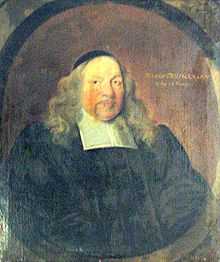Johann Deutschmann

Johann Deutschmann (August 10, 1625 – August 12, 1706) was a German Lutheran theologian.
Biography
Deutschmann was born in Jüterbog and studied at the University of Wittenberg. In 1657 he became extraordinary professor, and in 1662 ordinary professor at University of Wittenberg. During the Syncretistic Controversy and Pietistic controversy he represented the extreme orthodox Lutheranism; and opposed especially the younger Calixtus and the theology of the Pietists. Against Spener, the leader of the Pietists, he charged no less than 263 heresies. To his scientific interests belonged the development of the so-called Theologia paradisiaca, i.e., that Adam, the patriarchs, and the whole Old Testament agreed with the Augsburg Confession and Formulas of Concord. To prove this, he published an Antiquissima theologia positiva primi theologi Adami, a Symbolum apostolicum Adami; and Der christlutherischen Kirche Prediger-Beicht and Beichtstuhl von dem grossen Jehova-Elohim im Paradiese gestiftet.
Deutschmann was the son-in-law of the orthodox professor Abraham Calovius. He died in Wittenberg.
![]() This article incorporates text from a publication now in the public domain: Jackson, Samuel Macauley, ed. (1914). "article name needed". New Schaff–Herzog Encyclopedia of Religious Knowledge (third ed.). London and New York: Funk and Wagnalls.
This article incorporates text from a publication now in the public domain: Jackson, Samuel Macauley, ed. (1914). "article name needed". New Schaff–Herzog Encyclopedia of Religious Knowledge (third ed.). London and New York: Funk and Wagnalls.
|